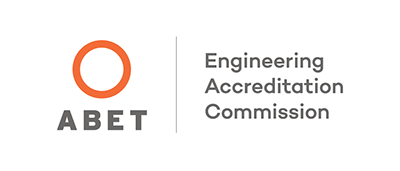- Home |
- Accreditation
Accreditation
The B.S. program in Industrial Engineering is accredited by the Engineering Accreditation Commission of ABET, https://www.abet.org, under the General Criteria and Program Criteria for Industrial and similarly named engineering programs.

Program Mission
To produce top caliber industrial and systems engineers through comprehensive, proactive and evolving educational programs, to conduct and disseminate leading edge research and scholarship, and to provide service to engineers, companies, government agencies, and professional societies associated with industrial and systems engineering.
Program Educational Objectives
The objectives of the Department of Industrial and Systems Engineering are founded in Mississippi State University’s Educational Philosophy and in the industrial engineering profession. They were developed to satisfy the needs of the department’s constituents: employers, alumni, faculty, and the industrial engineering profession.
The Industrial Engineering program aims to graduate students having a broad education, with emphasis in industrial and systems engineering fundamentals and practices, which enables them to function effectively in systems involving people, materials, information, energy, and money.
The educational objectives of the Bachelor of Science degree program in Industrial Engineering are:
- Graduates of the industrial engineering program are versed in math, science, and engineering theory, know how to apply that theory, and are capable of functioning effectively producing solutions in a broad range of organizations.
- Graduates of the industrial engineering program lead and interact cooperatively in professional situations with individuals having diverse backgrounds, cultures, training, education, and interests.
- Graduates of the industrial engineering program think independently, critically examine ideas, and make discerning professional judgments, whether intellectual, ethical, or aesthetic.
- Graduates of the industrial engineering program are professionally mature, responsible, and informed citizens who pursue lifelong learning.
Because of the importance of systems design in the many facets of industrial and systems engineering, instruction of the principles and methods of design is integrated throughout the curriculum of industrial engineering, and culminates in a major design experience in the student’s senior year.
Student Outcomes
The educational program outcomes for the Bachelor of Science degree program in Industrial Engineering are shared below:
- Students will be able to identify, formulate, and solve complex engineering problems by applying principles of engineering, science, and mathematics.
- Students will be able to apply engineering design to produce solutions that meet specified needs with consideration of public health, safety, and welfare, as well as global, cultural, social, environmental, and economic factors.
- Students will be able to communicate effectively with a range of audiences.
- Students will be able to recognize ethical and professional responsibilities in engineering situations and make informed judgments, which must consider the impact of engineering solutions in global, economic, environmental, and societal contexts.
- Students will be able to function effectively on a team whose members together provide leadership, create a collaborative and inclusive environment, establish goals, plan tasks, and meet objectives.
- Students will be able to develop and conduct appropriate experimentation, analyze and interpret data, and use engineering judgment to draw conclusions.
- Students will be able to acquire and apply new knowledge as needed, using appropriate learning strategies.
